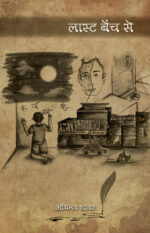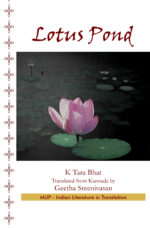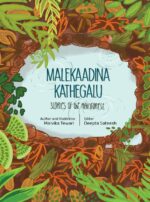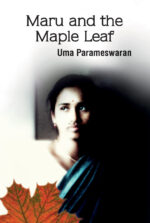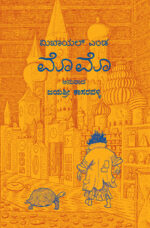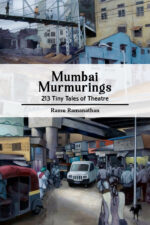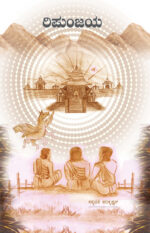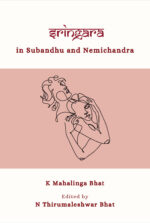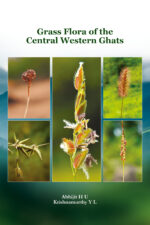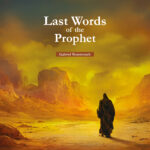-
Kempu Kanagile and Chitra
₹160.00Author: Rabindranath Tagore, Translator: Sudha Adukkala
ಕೆಂಪು ಕಣಗಿಲೆ: ಅದೆಂಥ ಗಾಢಾಂಧಕಾರವೇ ಇರಲಿ, ಪುಟ್ಟ ಹಣತೆಯೊಂದು ಅದನ್ನು ತೊಡೆಯಬಲ್ಲುದೆಂಬುದು ಸಾರ್ವಕಾಲಿಕ ಸತ್ಯ. ಅಂಥದೊAದು ಸಂಘರ್ಷದ ಕಥನವನ್ನು ಗುರುದೇವ ರವೀಂದ್ರರು ತಮ್ಮ ಈ ನಾಟಕದಲ್ಲಿ ಹೇಳಿದ್ದಾರೆ. ‘ಕೆಂಪು ಕಣಗಿಲೆ’ ತೆರೆದಿಡುವ ಕೌರ್ಯದ ಜಗತ್ತು ಇಂದು ಈ ಕಾಲಘಟ್ಟದಲ್ಲಿ ನಿಂತು ಬರೆದರೇನೋ ಎಂಬಷ್ಟು ತಾಜಾ ಆಗಿದೆ. ಇಲ್ಲಿಯ ರಂಜನ ಕೇವಲ ಒಂದು ಪಾತ್ರವಲ್ಲ; ನಾವೆಲ್ಲರೂ ನಮ್ಮೊಳಗೆ ತುಂಬಿಸಿಕೊಳ್ಳಬೇಕಾದ ಜೀವನ ಪ್ರೀತಿಯ ವಿವಿಧ ಆಯಾಮಗಳ ಪ್ರತಿನಿಧಿ. ಇಲ್ಲಿಯ ನಂದಿನಿ ಇಂದು ಜಗವ ಸಂತೈಸಬೇಕಾದ ತಾಯಿಹೃದಯದ ಪ್ರತೀಕವಾಗಿದ್ದಾಳೆ.
ಚಿತ್ರಾ: ಪೌರಾಣಿಕ ಕಥಾನಕವೊಂದರ ಪುನರ್ಲೇಖನದ ಈ ನಾಟಕವು ಹೆಣ್ಣು ಮತ್ತು ರಾಷ್ಟçವನ್ನು ಒಂದು ಸಂಕಥನವನ್ನಾಗಿ ಚರ್ಚಿಸುತ್ತದೆ. ಹೆಣ್ಣು-ಗಂಡಿನ ಘನತೆಯ ಬದುಕನ್ನು ಕನಸುವ ನಿರೂಪಣೆ ನಾವು ಕಟ್ಟಬೇಕಾಗಿರುವ ರಾಷ್ಟçದ ರೂಪುರೇಷೆಗಳನ್ನೂ ತನ್ನೊಳಗೆ ಆಡಕ ಮಾಡಿಕೊಂಡಿದೆ. ನಮ್ಮ ಅನನ್ಯತೆಯನ್ನು ಉಳಿಸಿಕೊಳ್ಳುತ್ತಲೇ ಇನ್ನೊಬ್ಬರೊಂದಿಗೆ ಸಹಬಾಳ್ವೆಯನ್ನು ನಡೆಸುವ ಬಗೆಯನ್ನು ಮಂಡಿಸುತ್ತದೆ. ತಾನು ಆರೋಪಿಸಿಕೊಂಡ ಕೃತಕ ತೆರೆಯನ್ನು ಸರಿಸುವ ಚಿತ್ರಾ ನಮ್ಮೊಳಗಿನ ಅರಿವಿಗೆ ತೊಡಕಾಗಿರುವ ಸಂಕುಚಿತತೆಯ ಪರದೆಯನ್ನೂ ಸರಿಸುತ್ತಾಳೆ.
Interested overseas readers may write to us at mup@manipal.edu about purchasing the book. -
Last Bench Se
₹130.00This is a collection of poems by Abhinav Grover which are well illustrated with sketches by some of his friends in this book. It is a collection of poems that he wrote while in engineering classes, as the author confesses. Some of them have already found appreciation in terms of prizes in competitions and praises by known poets.
Interested customers may write to us at mup@manipal.edu about purchasing the book.
Also available on

-
Lotus Pond
₹210.00Author: K Tara Bhat, Translator: Geetha Sreenivasan
Lotus Pond explores women’s plight beyond the emotional level; it is evident that the author is immensely intrigued by the feminist ideals.
The novel potently depicts how each woman is restrained by her own body; she is compelled to safeguard it at all costs. This becomes her inescapable destiny. It is ironical that the elite colony- Garden view, shares this helplessness with the neighbouring slums. Whether it is the attack on the composure of a rich woman- Krupa, or the inhuman exploitation of poor Chami’s infant, the common source of torment remains- patriarchal cruelty.
The entity which reigns supreme in the Garden View colony is money- a weapon wielded by men. In the grand houses of the colony, there are all the commodities that money can buy; still, the grandeur of these houses is incomplete, empty; devoid of sounds of joy. The residents think no more of love and compassion. Hence, they receive only these- a wealth which fails to bring love and contentment. Ayesha, who endures in this environment like a shadow, is a witness to this hypocritical way of life.
Tara Bhat gained prominence with her first novel Avyakta and continued to make valuable contribution to the Kannada literary world with her second endeavour- Lotus Pond.Interested customers may write to us at mup@manipal.edu about purchasing the book.
Also available on

-
Madhavi Kathana Kavya
₹195.00Author: ONV Kurup Translator: Parvathi G Aithal
ವ್ಯಾಸ ಮಹಾಭಾರತದ ಉದ್ಯೋಗ ಪರ್ವದಲ್ಲಿ ಬರುವ ಒಂದು ಉಪಾಖ್ಯಾನವನ್ನಾಧರಿಸಿ ಬರೆದ ಒಂದು ಕಾವ್ಯವಿದು. ಮೂಲಕಥೆಯಲ್ಲಿ ಮಾಧವಿಯ ಶೋಷಣೆ ಎದ್ದು ಕಾಣುವುದಿಲ್ಲ. ವಿಶ್ವಾಮಿತ್ರ ಶಿಷ್ಯನಾದ ಗಾಲವನು ತನ್ನ ವಿದ್ಯಾಭ್ಯಾಸವನ್ನು ಮುಗಿಸಿ ಹೊರಡುವಾಗ ‘ಗುರುದಕ್ಷಿಣೆಯಾಗಿ ಏನನ್ನು ಕೊಡಲಿ?’ ಎಂದು ಕೇಳುತ್ತಾನೆ. ವಿಶ್ವಾಮಿತ್ರರು ಗುರುದಕ್ಷಿಣೆ ಬೇಡವೆಂದರೂ ಕೇಳುವುದಿಲ್ಲ. ಕೊನೆಗೆ ವಿಶ್ವಾಮಿತ್ರರು, ‘ಒಂದು ಕಿವಿ ಮಾತ್ರ ಕಪ್ಪಾಗಿರುವ ಎಂಟುನೂರು ಶ್ವೇತಾಶ್ವಗಳನ್ನು ಕಾಣಿಕೆಯಾಗಿ ತೆಗೆದುಕೊಂಡು ಬಾ’ ಎಂದು ಹೇಳುತ್ತಾರೆ. ಆದರೆ, ಅಂಥ ವಿಶೇಷ ಗುಣದ ಕುದುರೆಗಳು ಬಹಳ ದುರ್ಲಭವಾದುವೆಂಬುದನ್ನು ಅರಿತಾಗ ಗಾಲವ ದಾನಶೂರ ಯಯಾತಿ ಮಹಾರಾಜನ ಬಳಿ ಸಹಾಯ ಬೇಡಲು ಹೋಗುತ್ತಾನೆ. ಆಗಷ್ಟೇ ದೊಡ್ಡದೊಂದು ಯಾಗ ಮುಗಿಸಿದ ಯಯಾತಿಯ ಬಳಿ ಅಶ್ವಗಳಿಲ್ಲ. ಆದರೆ, ತನ್ನ ಪ್ರತಿಷ್ಠೆಯನ್ನು ಉಳಿಸಿಕೊಳ್ಳುವುದಕ್ಕೋಸ್ಕರ ಯಯಾತಿ ತನ್ನ ಮಗಳು ಮಾಧವಿಯನ್ನು ಗಾಲವನ ವಶಕ್ಕೆ ಬಿಟ್ಟು ‘ರೂಪಸಿಯಾದ ಈಕೆಯನ್ನು ಬೇಕಾದ ಹಾಗೆ ಬಳಸಿಕೊಂಡು ನಿನಗೆ ಬೇಕಾದ ಅಶ್ವಗಳನ್ನು ಪಡೆ’ ಅನ್ನುತ್ತಾನೆ. ಹಾಗೆ ಗಾಲವನು ಮಾಧವಿಯನ್ನು ಮೂರು ಮಂದಿ ರಾಜರ ಬಳಿಗೆ ಕರೆದೊಯ್ದು ಅವರಿಂದ ತಲಾ ಇನ್ನೂರು ಅಶ್ವಗಳನ್ನು ಪಡೆದು ಆ ರಾಜರುಗಳಿಗೆ ಒಂದು ವರ್ಷದ ಮಟ್ಟಿಗೆ ಉಪಯೋಗಿಸಿಕೊಳ್ಳಲು ಮಾಧವಿಯನ್ನು ಒಪ್ಪಿಸುತ್ತಾನೆ. ಮೂಲ ಕಥೆಯಲ್ಲಿ ಮಾಧವಿಯ ಮನಸ್ಸಿನ ಸಂಘರ್ಷಗಳು ವ್ಯಕ್ತವಾಗಿಲ್ಲ. ‘ಪುರುಷರಿಂದ ಲೈಂಗಿಕವಾಗಿ ಎಷ್ಟು ಸಾರಿ ಬಳಸಲ್ಪಟ್ಟರೂ ನನ್ನ ಕನ್ಯತ್ವ ಉಳಿಯುವಂಥ ವರ ನನಗಿದೆಯಾದ್ದರಿಂದ ನಾನು ನಿನಗೆ ಸಹಾಯ ಮಾಡಬಲ್ಲೆ’ ಎಂದು ಗಾಲವನ ಬಳಿ ಅವಳೇ ಹೇಳುತ್ತಾಳೆ . ಓಎನ್ವಿ ಕುರುಪ್ ಬರೆದ ಈ ಕೃತಿಯಲ್ಲಿ ಅವರು ಕೆಲವು ಬದಲಾವಣೆಗಳನ್ನು ಮಾಡಿಕೊಂಡಿದ್ದಾರೆ. ಇಲ್ಲಿ ಇಡೀ ಕಥೆಯನ್ನು ಪುರುಷರಿಂದ ಘೋರ ಅನ್ಯಾಯಕ್ಕೊಳಗಾಗಿ ಮಾನಸಿಕ ಯಾತನೆಯನ್ನು ಅನುಭವಿಸಿರಬಹುದಾದ ಮಾಧವಿಯ ದೃಷ್ಟಿಯಿಂದ ಬರೆಯಲಾಗಿದೆ. ಆದ್ದರಿಂದ ಇದರ ಸ್ತ್ರೀವಾದಿ ಓದು ಒಂದು ವಿಶಿಷ್ಟ ಅನುಭವವನ್ನು ನೀಡುತ್ತದೆ.ಮಲಯಾಳದ ಜ್ಞಾನಪೀಠ ಪ್ರಶಸ್ತಿ ವಿಜೇತ ಸಾಹಿತಿ ಓಎನ್ವಿಕುರುಪ್ ಅವರ ‘ಸ್ವಯಂವರಂ’ ಎಂಬ ಖಂಡಕಾವ್ಯದ ಭಾವಾನುವಾದವಿದು. ಮಹಾಭಾರತದ `ಉದ್ಯೋಗ ಪರ್ವ’ ದಲ್ಲಿ ಬರುವ ಒಂದು ಉಪಾಖ್ಯಾನದಲ್ಲಿ ಪುರುಷ ವರ್ಗದಿಂದ ಘೋರವಾಗಿ ಶೋಷಣೆಗೊಳಗಾದ ಮಾಧವಿ ಈ ಕಥೆಯ ನಾಯಕಿಯಾಗಿದ್ದು ಇಡೀ ಕಾವ್ಯವೇ ಅವಳ ದೃಷ್ಟಿಕೋನದಿಂದ ರಚಿತವಾಗಿದ್ದರಿಂದ ಸ್ತ್ರೀವಾದಿ ಓದಿಗೆ ಒಳಪಡಿಸಲು ಅತ್ಯಂತ ಸೂಕ್ತವಾದ ಕೃತಿಯಿದು ಎಂದೆನ್ನಿಸಿ ಅನುವಾದಕಿ ಅದರ ಶೀರ್ಷಿಕೆಯನ್ನು ‘ಮಾಧವಿ ಕಥನ ಕಾವ್ಯ’ವೆಂದು ಬದಲಾಯಿಸಿದ್ದಾರೆ . ಇದನ್ನು ಓದಿದಾಗೆಲ್ಲ ರಾಮಾಯಣದ ಸೀತೆಯ ನೆನಪಾಗುತ್ತದೆ.
Interested customers may write to us at mup@manipal.edu about purchasing the book.
Also available on

-
Mahāmmāyi
₹195.00Author: Chandrasekhara Kambara, Translator: Kathyayini Kunjibettu
Mahāmmāyi is the story of the legend of Shatavithaayi – the Goddess of death, and her adopted son Sambhashiva. Out of affection for her son, Goddess Shatavithaayi blesses him with the “power of life”. The blessing was that death will evade the people who are treated by Sambashiva. But a certain condition set by Shatavithaayi forbade him from healing every ill man. The condition was that, if Shatavithaayi stood on the right side of the patient, Sambhashiva could treat that person and he would live; but, if she stood on the left side of the patient, he should not treat that person as his death was inevitable. Through a distinct method of story-telling, the story follows the life of Sambhashiva as he begins to question the ideas of fate and destiny. Thus, the conflict between fate and human efforts to change that fate is vividly described in this play. -
Mahila Mahabharatha
₹160.00Author: K Madhavan Translator: Abhilasha S
ಮಹಿಳಾ ಮಹಾಭಾರತ, ಇದು ಜೆಎನ್ಯು ದೆಹಲಿಯ ವಿಶ್ರಾಂತ ಪ್ರಾಧ್ಯಾಪಕರಾದ ಕೆ. ಮಾಧವನ್ ರಚಿಸಿದ ನಾಟಕ. ರಂಗ ನಿರ್ದೇಶಕರೂ ಆಗಿರುವ ಮಾಧವನ್ರನ್ನು ೧೯೯೪ರಲ್ಲಿ ಯೂನಿವರ್ಸಿಟಿ ದು ಕ್ವಿಬೀ ಎ ಮಾನ್ಟ್ರಿಯಲ್ ವಿಶ್ವವಿದ್ಯಾನಿಲಯ ತನ್ನ ವಿದ್ಯಾರ್ಥಿಗಳಿಗೆ ರಂಗ ನಿರ್ದೇಶನದ ತರಬೇತಿ ನೀಡಲು ಆಹ್ವಾನಿಸಿತ್ತು. ಆಗ ಒಂದು ವರ್ಷ ನಡೆಸಿದ ರಂಗ ಕಾರ್ಯಾಗಾರದ ಭಾಗವಾಗಿ ೧೯೯೫ ರಲ್ಲಿ ಮಾಧವನ್ ಈ ನಾಟಕವನ್ನು ಫ್ರೆಂಚ್ ಭಾಷೆಯಲ್ಲಿ ರಚಿಸಿ ನಿರ್ದೇಶಿಸಿದ್ದರು. ನಂತರ ಇದು ಜರ್ಮನಿ, ಫ್ರಾನ್ಸ್, ಆಸ್ಟ್ರೇಲಿಯಾ ಮುಂತಾದ ದೇಶಗಳಲ್ಲಿ ಆಯಾ ಪ್ರದೇಶದ ಕಲಾವಿದರಿಂದ ಪ್ರದರ್ಶಿಸಲ್ಪಟ್ಟಿತು. ಹಾಗೆಯೇ ಭಾರತದಲ್ಲಿಯೂ ಅನೇಕ ನಗರಗಳಲ್ಲಿ ಈ ನಾಟಕ ಪ್ರದರ್ಶನ ಕಂಡಿದೆ. ೨೦೦೫ರಲ್ಲಿ ಈ ನಾಟಕದ ಇಂಗ್ಲಿಷ್ ಅವತರಣಿಕೆಯು ಥಿಯೇಟರ್ ಇಂಡಿಯಾದಿAದ ಪ್ರಕಟವಾಯಿತು. <br> ಎಲ್ಲ ಕಾಲದ ಮಹಿಳಾ ಜಗತ್ತಿನ ಆಂತರ್ಯದಲ್ಲಿ ನಡೆಯಬಹುದಾದ ಮಹಾಯುದ್ಧದ ಕಥನವೇ ಮಹಿಳಾ ಮಹಾಭಾರತ. ಇಲ್ಲಿ ಪುರಾಣ ಮತ್ತು ವಾಸ್ತವ ಜಗತ್ತಿನ ನಡುವಿನ ಗೆರೆಯೇ ಅಳಿಸಿ, ಪೌರಾಣಿಕತೆ ಮತ್ತು ವಾಸ್ತವಿಕತೆ ಮುಖಾಮುಖಿಯಾಗುತ್ತವೆ. ಮಹಾಭಾರತ ಕಥೆಯ ಪರಿಧಿಯಲ್ಲಿದ್ದಿರಬಹುದಾದ ಎಲ್ಲ ತಾಯಂದಿರೂ ಈ ನಾಟಕದಲ್ಲಿ ಕೇಂದ್ರದತ್ತ ಚಲಿಸಿ ಕತೆ ಹೇಳುತ್ತಾರಾದ್ದರಿಂದ, ಮಹಿಳಾ ಕಣ್ನೋಟದ ಮಹಾಭಾರತ ಇಲ್ಲಿ ಗೋಚರವಾಗುತ್ತದೆ. ವಿಶೇಷವೆಂದರೆ, ಈ ಇಡೀ ಕಥನದ ಸೂತ್ರಧಾರಿಣಿ, ಸಮಕಾಲೀನ ಜಗತ್ತಿನ ಅಸಹಾಯಕ, ಹತಾಶ ತಾಯಿ. ಇಲ್ಲಿ ಪುಟ್ಟ ಪೆಟ್ಟಿಗೆಯಲ್ಲಿ ಜೀವಶಕ್ತಿಯ ಬೀಜ ನೆಟ್ಟು ಅದು ಮೊಳಕೆಯೊಡೆದು ಬೃಹತ್ ವೃಕ್ಷವಾಗಿ ಅಡುಗೆ ಮನೆಯನ್ನೇ ಸ್ಪೋಟಿಸುವ ಹೆಣ್ಣುಗಳಿದ್ದಾರೆ, ಮರಕ್ಕೆ ಕಟ್ಟಿ ಸುಟ್ಟು ಹಾಕುತ್ತಿರುವ ಅಣ್ಣಂದಿರನ್ನೇ ನೋಡಿ ಗಹಗಹಿಸುವ ತಂಗಿಯರಿದ್ದಾರೆ, ಹೆಣ್ಣುಗಳ ನಿಟ್ಟುಸಿರ ತಾಪಕ್ಕೆ ಗುರಿಯಾಗಿ ನಲುಗುತ್ತಿರುವ ಗಂಡುಮಕ್ಕಳ ಸಂಕಟ ಕಂಡು ಮರುಗುತ್ತಿರುವ ತಾಯಂದಿರಿದ್ದಾರೆ. ಆದಿಯಿಂದ ಅಂತ್ಯದವರೆಗೆ ತೂಗುವ ತೊಟ್ಟಿಲು, ಅನುರಣಿಸುವ ಜೋಗುಳದ ಜೊತೆಗೆ ಹೆಮ್ಮಕ್ಕಳು ನೀಡುವ ಶಾಪದ ಸರಮಾಲೆಯೂ ಇಲ್ಲಿದೆ.
Interested readers may write to us at mup@manipal.edu about purchasing the book.
Also available on

-
Makkala Padyamanjari
₹180.00Author: Kayyara Kinhanna Rai
ಮಕ್ಕಳ ಪದ್ಯಮಂಜಿರಿ ಶ್ರೀ ಕಯ್ಯಾರ ಕಿಞ್ಞಣ್ಣ ರೈ ಅವರಿಂದ ಮಕ್ಕಳಿಗಾಗಿ ಕವನಗಳ ಪುಸ್ತಕ. ಶ್ರೀ ಕಯ್ಯಾರರ ಕವನಗಳು ಎಲ್ಲಾ ಹಿನ್ನೆಲೆಯ ಜನರನ್ನು ತಲುಪುವುದರಿಂದ ಹೆಚ್ಚಿನ ಕನ್ನಡಿಗರು ಕಾವ್ಯವನ್ನು ಓದುವ ಬೆಳವಣಿಗೆಯನ್ನು ಹೊಂದಿದ್ದಾರೆ. ಗ್ರಾಮೀಣ ಅಥವಾ ನಗರ, ಶ್ರೀಮಂತ ಅಥವಾ ಬಡ. ಈ ಕವಿತೆಗಳಲ್ಲಿ ಬಾಲ್ಯದ ಸವಿನೆನಪುಗಳು ಅಡಗಿದ್ದು, ಓದುವಾಗ ಓದುಗರಿಗೆ ನಾಸ್ಟಾಲ್ಜಿಕ್ ಆಗುವುದರಿಂದ ಅವು ದೊಡ್ಡವರಲ್ಲಿಯೂ ಜನಪ್ರಿಯವಾಗಿವೆ. ಕಲಾವಿದ ಪ್ರಸಾದ್ ರಾವ್ ಜಿ ಅವರು ಚಿತ್ರಿಸಿದ ಚಿತ್ರಗಳೊಂದಿಗೆ ಪ್ರಸ್ತುತ ಪುಸ್ತಕವು ಓದುವಿಕೆಯನ್ನು ಇನ್ನಷ್ಟು ಆಸಕ್ತಿದಾಯಕವಾಗಿಸುತ್ತದೆ. ಇದು ಶ್ರೇಷ್ಠ ಕವಿ, ಬರಹಗಾರ ಕಯ್ಯಾರ ಅವರ ಶತಮಾನೋತ್ಸವ ವರ್ಷದಲ್ಲಿ ಹೊರತರಲಾದ MUP ಯ 50 ನೇ ಪ್ರಕಟಣೆಯಾಗಿದೆ.
Interested readers may write to us at mup@manipal.edu about purchasing the book.
-
Malekaadina Kathegalu – Stories of the Rainforest
₹450.00Author: Malvika Tewari, Editor: Deepta Sateesh
Malekaadina Kathegalu is a fictional story set in the rich dense rainforest of Agumbe, narrating the journey of Nitya, a young girl who travels to the small village with her father, a conservationist. This book is the result of a research experiment responding to and reimagining the People’s Biodiversity Register (PBR), a tool used to document biological diversity of local communities. Set in the Western Ghats, the story weaves popular references like Malgudi Days in the narrative with the experiences of the people living in Agumbe, Karnataka.
To most people, the Western Ghats is a range of hills on the west coast of India with lush forests in the monsoon and a repository of minerals. It is also a UNESCO World Heritage site and a biodiversity hotspot. To the residents of Agumbe, it is much more: cultural relations, ritual practices, and connections with other-than-human sentient beings. The nature-culture understandings, which comprise of everyday practices of food, kitchen gardens, and medicinal practices, and wandering on foot are experienced by Nitya throughout the story.
Malekaadina Kathegalu reflects the realities and complexities surrounding countless changes in ancient ecologies due to pressures of rapid development, and the diverse aspirations of new generations in a time of environmental crisis. It records the rich diversity of other-than-human beings and material and atmospheric changes across time through primary research using creative mixed methods.
Interested customers may write to us at mup@manipal.edu about purchasing the book.
-
Maru and the Maple Leaf
₹550.00Author:Uma Parameswaran
Maru and the Maple Leaf follows Priti Moghe as she reads through three cartons of writings that she has inherited from Maru Sivaraman. Priti and Maru are themselves characters from the author’s oeuvre. Ingeniously, she has interwoven a biography of her own writing life into Priti’s relationship with her fellow doctor, Stephen Woodhouse.
Interested customers may write to us at mup@manipal.edu about purchasing the book.
Also available on

-
MOMO
₹450.00Author:
The fantasy novel originally written in German and translated into English, has been enjoyed by millions of readers worldwide. It has now been translated into Kannada as well. The novel has a very unusual story about time. The story describes how people in the modern era use the time, and a girl named MOMO teaches how it should be used. Humans have stolen time from modern societies, and a little girl of mysterious origin brings it back. In today’s society, the story has timeless relevance.
ನಗರದ ಅಂಚಿನಲ್ಲಿ ಹಾಳುಬಿದ್ದಿದೆ ಒಂದು ಆಂಪಿ ಥೀಯೇಟರ್. ಅಲ್ಲಿರುವ ದಿಕ್ಕಿಲ್ಲದ ಪುಟ್ಟ ಹುಡುಗಿ ಮೊಮೊ. ಒಂದು ದಿನ ಬೂದು ಬಣ್ಣದ ಬಟ್ಟೆ ತೊಟ್ಟು ದುಷ್ಟರು ಸದ್ದಿಲ್ಲದೇ ಬಂದು ನಗರವನ್ನು ಆಕ್ರಮಿಸಿಕೊಳ್ಳುತ್ತಾರೆ. ಅವರನ್ನು ಹಿಮ್ಮೆಟ್ಟಿಸುವ ಶಕ್ತಿಯಿರುವುದು ಮೊಮೊಗೆ ಮಾತ್ರ. ಅವಳು ಪ್ರೊಫೆಸರ್ ಹೋರಾ ಮತ್ತು ಅವರಲ್ಲಿರುವ ವಿಚಿತ್ರ ಆಮೆಯ ನೆರವಿನಿಂದ ಕಾಲದ ಸರಹದ್ದುಗಳನ್ನು ದಾಟಿ ಆ ದುಷ್ಟರ ಒಳಸಂಚುಗಳನ್ನು ಬಯಲುಮಾಡುತ್ತಿದ್ದಾಳೆ. ‘ಮೊಮೊ’ ಕಾಲವನ್ನು ಕದಿಯುವವರ ಕಥೆಯಾಗಿರುವ ಜೊತೆಗೇ ಕದ್ದ ಕಾಲವನ್ನು ಮತ್ತೆ ಜನರಿಗೆ ತಂದುಕೊಡುವ ಒಂದು ಮಗುವಿನ ಸಾಹಸಮಯ ಕಥೆಯು ಆಗಿದೆ.
Interested customers may write to us at mup@manipal.edu about purchasing the book.
-
Mumbai Murmurings: 213 Tiny Tales of Theatre
₹640.00Author: Ramakrishnan Ramanathan
Mumbai Murmurings: 213 Tiny Tales of Theatre is an anecdotal compilation of behind-the-scenes experiences of Mumbai theatre. Alphabetically structured, each letter contains an abundance of stories, connected by a subjective commentary in the form of “Greenroom Gupshup”. This book takes the readers through the memory lanes of theatrewalas: it introduces personages, notable street corners and khanawals, and remarks upon play performances through the years.
Interested readers may write to us at mup@manipal.edu about purchasing the book.
-
Nala Charitre: The Legend of Nala(A Short Epic)
₹295.00This book presents the mythological narrative of Nala-Damayanti as an epic poem in English. Among the luminaries of sixteenth century Bhakti tradition, Kanakadasa’s literary and musical compositions (kirtanes) are imbued with philosophical meanings, which show immense formative influence on the cultural and literary scene of Karnataka. Also, Kanakadasa’s literary works such as Mohana Tarangini, Haribhaktisara, and the eminent allegorical masterpiece Ramadhanya Charitre incorporate metaphors taken from everyday life, which fascinate the commoners and offers them respite from mundane life-struggles. While such metaphorical expressions represent a remarkable trend in Bhakti poetry, in Kanakadasa?s depiction of Nala and Damayanti’s misfortunes, the toilsome life of common men and women stares forth. Hauled out of their palatial leisurely living, a curious turn of events compels them to survive amidst endless suffering. On one hand Nala Charitre is a poignant story of love, and on the other, it thematizes human existence, humandivine relationship and simplifies poetry to reach the audience beyond the limited circle of literates. As the Bhakti Literature assimilates the vernacular into devotional poetry, Kanakadasa?s epic poem interweaves mythological themes from Mahabharata with struggles of medieval Indian society, thus overcoming the binaries of human and divine.
-
Post Googlism and Other Short Stories
₹350.00Author: R C Natarajan
This collection of short stories is for the fast-paced millennials, whom the author calls “The Post Googlist Generation” who want everything hastily, at their finger-tips and on the go. The language has also shrunk in size to allow the pace. The world-view of this generation is that what cannot be done through an app cannot and should not be done. Their expectations of a story are a striking start, a quickly built middle and an interesting end. Stories in the collection seek to meet these expectations of this generation talking to them in their own language. They also echo the changing lives and changing aspirations of the time.
Interested readers may write to us at mup@manipal.edu about purchasing the book.
-
Pot of Butter and other short stories
₹250.00Author: Sunanda Belgaumkar Translator: Sa Usha, Vaijayanti Suryanarayana
Pot of Butter and other Short Stories is a collection of nine short stories, originally composed by Sunanda Belgaumkar in Kannada, handpicked and translated from her collections – Kajjaya and Koduvudenu Kombudenu. The bulk of her literary work including the stories in this book are inspired by the experiences in her early life, in the rustic and robust atmosphere of Dharwad. Her stories are predominantly semiautobiographical, laced with a liberal dose of artistic freedom.
This collection weaves together her writings on the underprivileged and marginalized as seen from the comfort of her palatial home, but rendered with compassion and empathy. Often, we find her narrative infused with self-directed questions such as, “What if I was in her shoes? ” or “Could that have been me? ” These stories are reflections on human nature, suffering, and destiny. There is hope, there is despair. There is love, there is longing. There is defeat, and there is triumph. In her stories, an oft-recurring metaphor for picking up one’s life after loss is a scorching summer followed by a torrential downpour and subsequently a plant springing to life.
As a translation, this book attempts to introduce Sunanda Belgaumkar’s literary and artistic creations to the non-Kannada reader, retaining as much of the indigenous elements of the original writings as possible. In doing so, it seeks to preserve the cultural climate of North Karnataka as it was around fifty years ago.
Interested readers may write to us at mup@manipal.edu about purchasing the book.
-
-
Saga of The Uprooted
₹95.00Author: Ranga Hari, Translator: Saratchandra Shenoi
This English translation of Visthapanachi Katha, a Konkani Khanda Kavya, depicts the saga of the migration of the Konkani community from Goa to a land far away from home. This collection of poems encapsulates the reign of a colonial power over the region of Goa that began with the entry of the Portuguese in the 16th century. It illustrates the displacement of the Konkani people and their resurgence at Cochin port. The poems describe the transformation of Goa – both culturally and topographically – and the people of Goa who were plundered, displaced, uprooted, and were forced to strip off their culture and identity. The poet is unfolding the tale of his very own ancestors by tracing out these events and graphically portraying the plight of the Konkani people. Saratchandra Shenoi, the author of this English translation, is a multilingual translator and a Sahitya Akademi Award winning (Antarnad – 1999) Konkani poet based in Kochi. He has over twenty books to his credit which include collections of poetry, works of fiction and non-fiction, translations, edited anthologies and language guides. Ranga Hari is the author of the Konkani original text titled Visthapanachi Katha. He has written more than twenty-five books in different languages, and was associated with Bharatiya Sikshan Mandal and Vidya Bharati.
Interested readers may write to us at mup@manipal.edu about purchasing the book.
-
Sangeetha Lokadrishti
₹295.00Author: Sumangala
ತಂದೆ-ಮಗಳ ಸುರಬಹಾರಿನ ಸಂಗೀತಬಂಧದ ಚಿತ್ರಣದಿಂದ ಆರಂಭಗೊಳ್ಳುವ ಈ ಕಿರುಕೃತಿಯು ಸಾಗರ ವೀಣೆ ರೂಪುಗೊಳಿಸಿದ ಇನ್ನೊಂದು ತಂದೆ-ಮಗಳ ಸಂಗೀತಬಂಧದ ಚಿತ್ರಣದೊಂದಿಗೆ ಮುಕ್ತಾಯವಾಗುತ್ತದೆ. ಇಲ್ಲಿ ನಾಲ್ವರು ಸಂಗೀತಗಾರರ ಬದುಕಿನ ಕೆಲವು ಸನ್ನಿವೇಶಗಳು, ಸಂಗೀತಪಯಣದಲ್ಲಿ ಅವರು ಸಾಗಿದ ಹಾದಿ, ಕಠಿಣ ಸಂದರ್ಭಗಳು, ಅವರ ಸಾಂಗೀತಿಕ ಮನೋಧರ್ಮ, ರಾಗರೂಪದ ಕುರಿತ ದೃಷ್ಟಿಕೋನ, ಇತ್ಯಾದಿ ಅಂಶಗಳ ಸ್ಥೂಲ ಚಿತ್ರಣವಿದೆ.
ಸುರಬಹಾರಿನ ದಂತಕಥೆಯೆಂದೇ ಹೇಳಬಹುದಾದ ವಿದುಷಿ ಅನ್ನಪೂರ್ಣಾ ದೇವಿಯವರ ಖಾಸಗಿ ಬದುಕು, ಏಕಾಂತ ನಿಗೂಢವೆನ್ನಿಸುವ ಹಾಗೆಯೇ ಮೈಹರ್ ಘರಾನೆಯ ಸ್ವರಸಂಪತ್ತನ್ನು ಶಿಷ್ಯರಿಗೆ ಧಾರೆಯೆರೆದು ಕಲಿಸುತ್ತ, ಹಲವರನ್ನು ಮೇರು ಕಲಾವಿದರಾಗಿ ರೂಪುಗೊಳಿಸಿದ ಬಗೆಯೂ ಅನನ್ಯ. ಕೃತಿಯಲ್ಲಿ ಚಿತ್ರಿಸಿದ ಇನ್ನುಳಿದ ಮೂವರು ಸಂಗೀತಗಾರರು ನಮ್ಮ ನೆರೆಯ ಪಾಕಿಸ್ತಾನದ ಶಾಸ್ತ್ರೀಯ ಸಂಗೀತ ಪರಂಪರೆಯನ್ನು ಇನ್ನಷ್ಟು ಸಮೃದ್ಧಗೊಳಿಸಿದವರು.
“ಏ ದಯ್ಯಾ… ಕಹಾಂ ಗಯೇ ವೇ ಲೋಗ್… ಬ್ರಿಜ ಕೆ ಬಸಯ್ಯಾ…”
ಮನುಷ್ಯರ ನಡುವೆ ಹತ್ತುಹಲವು ಬಗೆಯ ದ್ವೇಷದ ಗೋಡೆಗಳು ಎದ್ದು ನಿಂತಿರುವ ಇಂದಿನ ದಿನಮಾನದಲ್ಲಿ ಭಿನ್ನತೆಗಳಿದ್ದರೂ ಪರಸ್ಪರ ಸಂವಾದ ನಡೆಸುತ್ತಿದ್ದ ಆ ಜನರನ್ನು, ಆ ಕಾಲಘಟ್ಟವನ್ನು ಮತ್ತೆ ಕಂಡುಕೊಳ್ಳಲು ಬಹುಶಃ ಇಂತಹ ಸಂಗೀತಗಾರರ ಕೊರಳೊಳಗಿನ, ಬೆರಳೊಳಗಿನ ಸ್ವರಗಳೇ ನಮ್ಮ ಕೈಹಿಡಿದು ಮುನ್ನಡೆಸಬೇಕಿದೆ.
Interested readers may write to us at mup@manipal.edu about purchasing the book.
-
Sati Kamale
₹240.00Author: S U Paniyadi Translators: B Surendra Rao, K Chinnappa Gowda
This eponymous novel is centred on Kamale, who is an embodiment of wifely virtue. For fifteen long years Kamale lives the life of a widow to the outside world, nurturing the hopes of reuniting with the husband one day. Alone in the room, each night she wears her marks of a married woman with the dagger gifted by Umesha next to her. It could be seen as an exposition on the then existing indigenous discourse in India in the 19th century and early 20th century. Kamale, in her rigorous commitment and in retrieving her husband from ‘death’, is fashioned after Savithri in an intertextual reference to Mahabharata’s episode of “Satyavan and Savithri”. The novel might look conservative for the present-day reader, but it is a representative literary work of the time when Paniyadi, among many others, wanted to regain the independent status of the Tulu language which had somehow slipped out of its pedestal.
Interested readers may write to us at mup@manipal.edu about purchasing the book.
-
Sringara in Subandhu and Nemichandra
₹430.00Author: Mahaling Bhat, Editor: N Thirumaleshwara Bhat
The Vāsavadattā by Subandhu and the Līlāvati Prabandham by Nēmicandra are two renowned Campū Kāvyas (epic poem) in Kannada, which can be traced back to the early half of 700 BCE. K Mahalinga Bhat published a comprehensive analysis of the epic poems in 1966, situating the original works in their cultural and historical contexts. This book highlights the folk-tale motifs, the characterization and delineation of various Rasas, and analyzes the language of the epics. It also includes excerpts in Sanskrit from both works, accompanied by prose translations.
The original stories are characterized by the element of Śṙṅgāra (Romance). In this book, the aspect of romance in the narratives and the lives of the protagonists is seen through a contemporary lens. It highlights societal conditions and norms prevalent between 700 to 600 BCE in Vāsavadattā and Līlāvati Prabandham in a different light. This new edition compiled by N Thirumaleshwara Bhat draws attention to the relevance of epic poems today and the universality of their narrative.
Interested readers may write to us at mup@manipal.edu about purchasing the book.
-
Sümi and the Dance of the Dark Spirits
₹199.00Author: Toinali Sema
Join the shy Moi, spirited Sumi and brave Vikai in this folk-fantasy adventure of self-discovery, bravery, mystery, and above all loyalty and friendship as they embark on a journey into unfamiliar territories and encounter supernatural beings, get chased by spirits, befriend dragonflies, meets the wind family, and fight the dark spirits.
Interested customers may write to us at mup@manipal.edu about purchasing the book.
Also available on



